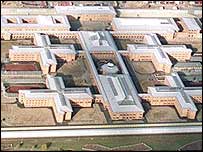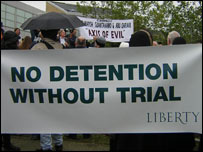|
TERRORISM |
|
HOME CUISINE ENVIRONMENT INSURANCE HORSES LEGENDS LAW NEWS PRODUCE RIGHTS SITE INDEX TRANSPORT WHISTLEBLOWING |
|
Terror detainees win Lords appeal - Thursday, 16 December, 2004
Detaining foreign terrorist suspects without trial breaks human rights laws, the UK's highest court has ruled.
I think most people would agree that an attack on any country involving the taking of innocent civilian lives is appalling.
To think that any intelligent person would consider strapping a bomb to himself to deliberately harm others, simply to gain attention for his cause, says something about the mind set of extremist politicians outside the arena of normal democratic processes.
Having experienced first hand what many people would agree is unreasonable use of authority, where local authority and planning in England is concerned, I can well understand that if you take everything away from someone, or what is perceived as everything to that person, then in those circumstances Governments can expect unpredictable results.
Nelson
says: "Listen and Learn"
Perhaps
then, it is time for world powers to put in place an international,
impartial and formally recognized mechanism to give a threatened
minorities a political voice, without having to resort to barbaric
means. Organizations or groups wishing to have their concerns aired,
could then do so and in the process, reduce (if not eliminate) the
constant threat to world peace, so much on the minds of politicians
everywhere. Unfortunately, there will always be someone somewhere
frustrated enough to want to take lives. The golden rule here is:
"He who shouts first, has already lost the argument." I
find I agree with the House of Lords, it is contrary to the Human Rights
Act, Article 6, to lock someone up without giving them a fair trial within
a reasonable time. On the other hand we should be able to protect
ourselves from terrorists. The question is, "How can this be
achieved and still conduct ourselves in a manner which protects the rights
of the individual". Put yourselves in the shoes of one of the
accused. Let us say you are innocent and you cannot afford legal
representation. Let us also say you are simply passing through a
foreign country on a Gap Year. You
would expect to be treated with some respect. You would expect to be
told exactly what it is you are accused of, and you would expect a
solicitor to be appointed for the charges to be tried or otherwise
dropped. You would not expect to be deprived of your liberty, simply
because your captors had insufficient evidence to secure a successful
prosecution! In England we should uphold the assumption that you are
innocent until proven guilty! LATEST
NEWS
In
a blow to the government's anti-terror measures, the House of Lords ruled
by an eight to one majority in favor of appeals by nine detainees. The
Law Lords said the measures were incompatible with European human rights
laws, but Home Secretary Charles Clarke said the men would remain in
prison.
Most
of the men are being held indefinitely in Belmarsh prison, south London.
The
ruling creates a major problem for Mr Clarke on his first day as home
secretary following David Blunkett's resignation. In a statement to
MPs, Mr Clarke said: "I will be asking Parliament to renew this
legislation in the New Year. "In the meantime, we will be
studying the judgment carefully to see whether it is possible to modify
our legislation to address the concerns raised by the House of
Lords."
Solicitor
Gareth Peirce, who represents eight of the detainees, said: "The
government has to take steps to withdraw the legislation and release the
detainees."
If
there was no swift government action, the detainees could ask the European
Court of Human Rights to get involved, she added.
The
Liberal Democrats say Mr Clarke should use the fact he is new to the job
to take issue with a law established by his predecessor, David Blunkett.
The detainees took their case to the House of Lords after the Court of
Appeal backed the Home Office's powers to hold them without limit or
charge.
The
government opted out of part of the European Convention on Human Rights
concerning the right to a fair trial in order to bring in anti-terrorism
legislation in response to the 11 September attacks in the US.
Belmarsh
Prison
But
those detained cannot be deported if this would mean persecution in their
homeland.
On
Thursday, Lord Bingham - a senior law lord - said the rules were
incompatible with the European Convention on Human Rights as they allowed
detentions "in a way that discriminates on the ground of nationality
or immigration status" by justifying detention without trial for
foreign suspects, but not Britons.
Lord
Nicholls of Birkenhead, in his ruling, said: "Indefinite imprisonment
without charge or trial is anathema in any country which observes the rule
of law. "It deprives the detained person of the protection a
criminal trial is intended to afford."
But
Lord Walker of Gestingthorpe, the one law lord to oppose the appeal, said
the anti-terror laws contained important safeguards against oppression.
In
a statement, detainee 'A' in Woodhill Prison said: "I hope now that
the government will act upon this decision, scrap this illegal 'law' and
release me and the other internees to return to our families and loved
ones."
The
case was heard by a panel of nine law lords rather than the usual five
because of the constitutional importance of the case.
The commission ruled on 30 July, 2002 that the anti-terror act unjustifiably discriminated against foreign nationals as British people could not be held in the same way. But that ruling was later overturned by the Court of Appeal who said there was a state of emergency threatening the life of the nation.
Liberty Protestors Banner
Belmarsh - Britain's Guantanamo Bay?
Profiles: What we know about the detainees
Law Lords ruling in full (382kb)
BBC
News Front Page | World
| UK |
England
| Northern
Ireland | Scotland
| Wales
| Politics
London:
The British government is expected to run into trouble with opposition parties on Tuesday when it unveils a new anti-terror bill that gives the interior minister power to place suspects under house arrest. Home Secretary Charles Clarke is expected to make limited concessions to appease his critics, however, by announcing that the so-called control orders for terrorist suspects will be subject to a limited review by a senior judge.
In a statement to the House of Commons later in the day, he will also emphasise the need for the new legislation to counter a heightened terrorist threat in the country, and with the current law due to expire on March 14.
"I find it unimaginable that people will say that faced with the terrorist threat that we have... we should simply abandon our existing legislative framework and do absolutely nothing in its place," Clarke told BBC radio, accusing the main opposition Conservative Party of adopting such a stance.
Clarke is expected to reveal that he would issue the initial detention or restriction order and any renewal, but a high court judge would have the power to overturn his decision in relation to a house arrest order within seven days.
The Conservatives and rival Liberal Democrat Party have insisted that all such anti-terror orders, which include banning someone from using a phone or a computer, should be the job of the judiciary alone.
"You still have this fundamental problem of giving to a politician, to the Home Secretary, the power to take somebody's freedom away," the Liberal Democrat's home affairs spokesman Mark Oaten told BBC radio. "And we just don't think that any politician should have that power."
While recognizing that terrorism was a major issue, Oaten argued that it was not an excuse to trample on the key principles of justice, adding that the bill in its current form would fail to pass through Britain's unelected House of Lords, which can delay but not overturn legislation. Failure to promulgate the bill would potentially leave Britain without any anti-terror rules after the Anti-Terrorism, Crime and Security Act 2001, deemed unlawful by the House of Lords in December, expires on March 14.
"That is why it is important that we can still try to persuade the government to think again on a couple of issues of principle so we can at least get an alternative in place, rather than renewing something which the House of Lords and the law lords have said is unlawful," Oaten said. In Britain, draft legislation is required to pass through the elected House of Commons followed by the House of Lords before it is signed into law.
Clarke's proposals have triggered further outrage after it was announced that he hopes to rush it through the Commons in just two days -- restricting time for proper debate.
In an 8-1 ruling on December 16, the Law Lords, the country's highest court ruled that detaining foreign terror suspects indefinitely without trial violated human rights laws.
In January, Clarke announced that such suspects would no longer be jailed indefinitely but placed under "control orders," such as curfews, electronic tagging or a form of house arrest.
The measures, he said, would apply equally to foreigners and Britons to avoid discrimination. In the last few weeks, two of 12 foreign terror suspects who were jailed indefinitely without trial have been released on bail, their lawyers said. One of them, an Egyptian, was instead placed under house arrest, his lawyer said.
With thanks to Action Groups across the country for the supply of real case history and supporting documents. *THAT THE PUBLIC MAY KNOW*
|
|
This site is free of © Copyright except where specifically stated. Any person may download, use and quote any reference or any link, and is guaranteed such right to freedom of information and speech under the Human Rights and Freedom of Information Acts. However, be aware that we cannot be held liable for the accuracy of the information provided. All users should therefore research matters for themselves and seek their own legal advice and this information is provided simply by way of a guide. Horse Sanctuary UK Limited. All trademarks herby acknowledged. |


